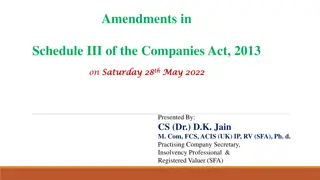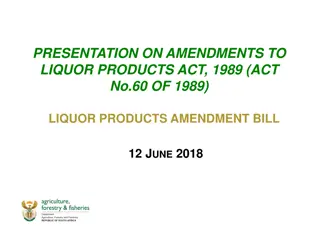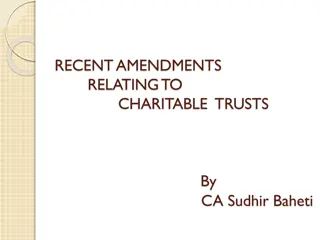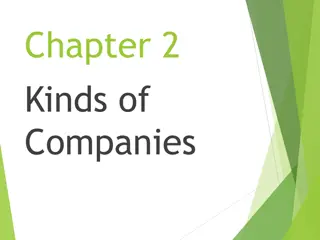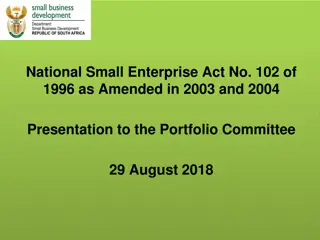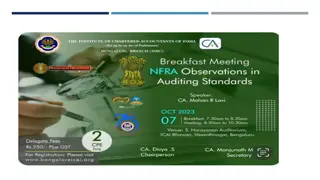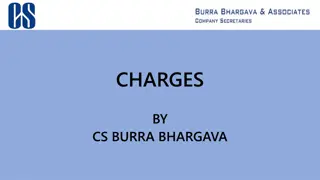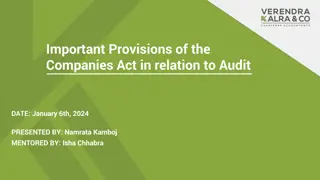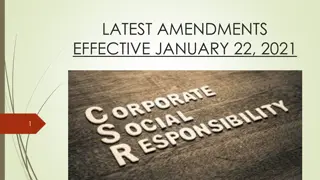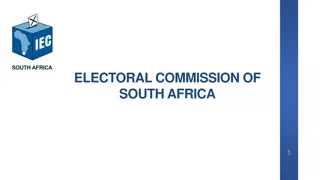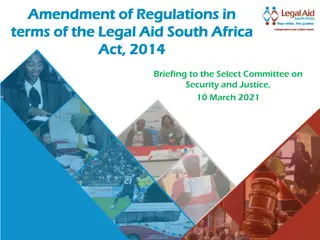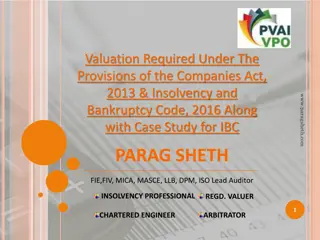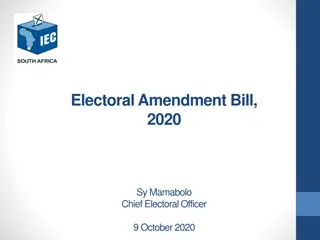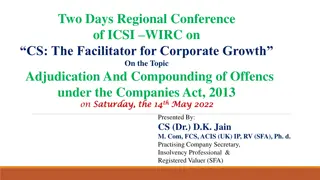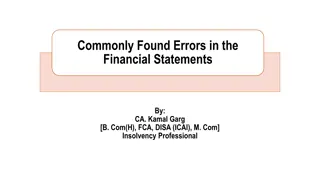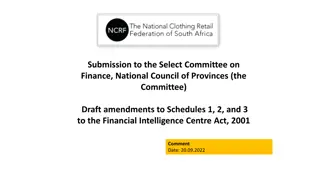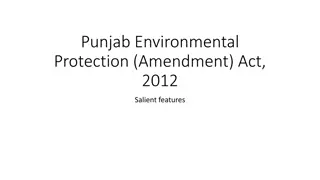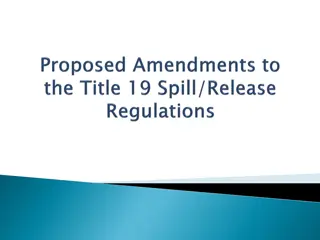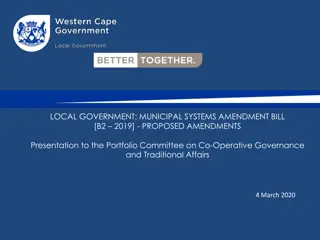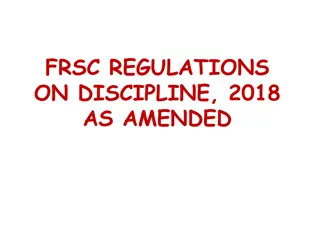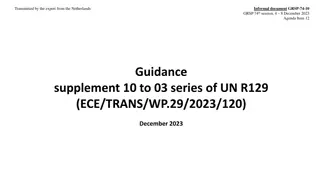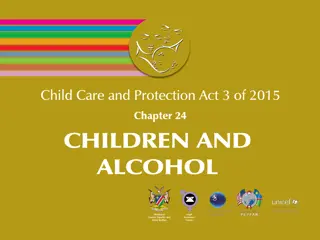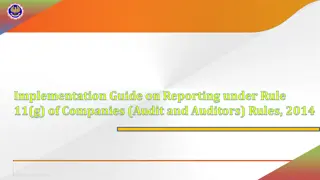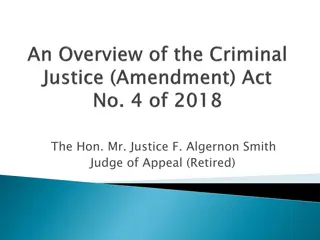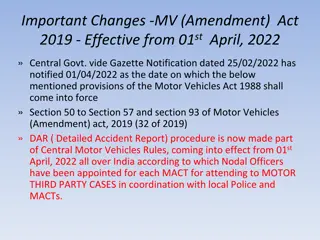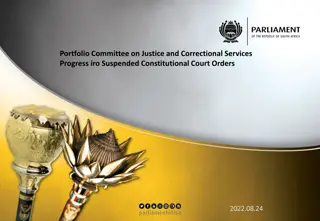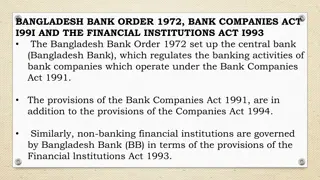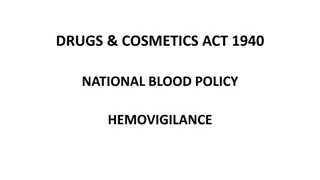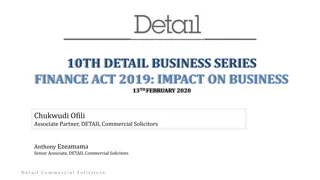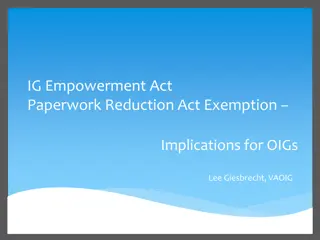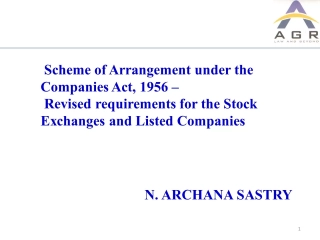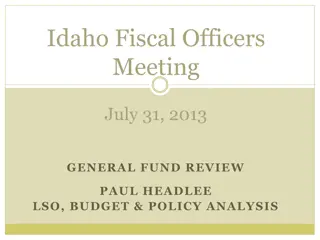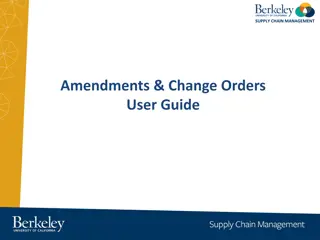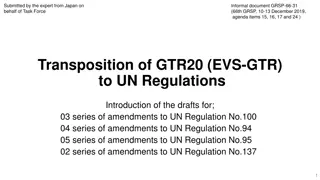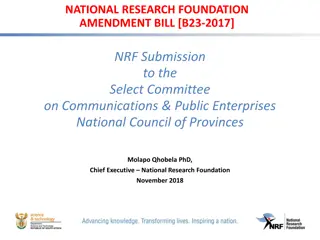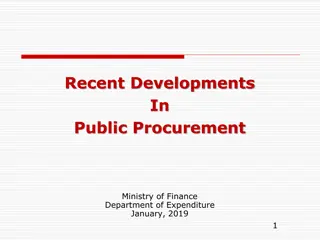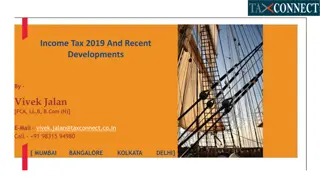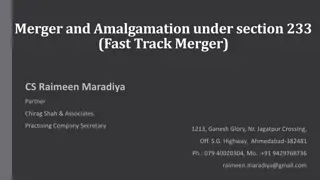Recent Amendments in Companies Act, 2013: An Overview
The Companies Act, 2013, a significant legislation in India, underwent amendments to enhance corporate governance and compliance. Passed in 2012, the Act regulates aspects of corporate entities, fostering transparency and accountability. The amendments aim to adapt to evolving business landscapes and streamline legal procedures for companies operating in India.
Download Presentation

Please find below an Image/Link to download the presentation.
The content on the website is provided AS IS for your information and personal use only. It may not be sold, licensed, or shared on other websites without obtaining consent from the author. Download presentation by click this link. If you encounter any issues during the download, it is possible that the publisher has removed the file from their server.
E N D
Presentation Transcript
RECENT AMENDMENTS IN COMPANIES ACT, 2013
INTRODUCTION TO COMPANIES ACT, 2013 The Companies Bill was passed by the Lok Sabha (the Lower House of the Parliament of India) on 18 December 2012 and in the Rajya Sabha (the Upper House of the Parliament of India) on 8 August 2013. It received Presidential Assent on 29th August 2013 thereby creating the CompaniesAct 2013. The new Companies Act is a positive step towards modernising India s company law and aligning it to global standards. It has given increased decision making powers to the company, and introduced provisions giving minority shareholders additional rights and protections. The introduction of one person companies and small companies should alleviate some of the administrative burdens that small businesses have to bear, but larger companies should prepare themselves for further administrative burdens as a result of changes in the appointment of auditors and directors.
EVOLUTION OF THE COMPANIES ACT, 2013 The Companies Act, 2013 has undergone five major amendments so far. The Companies (Amendment) Act of 2015 and 2017 aimed at enhancing the efficiency and promote ease of doing business. The Companies Act, 2013 was also amended by The Insolvency and Bankruptcy Code of 2016 and Finance Act of 2017. The Insolvency and Bankruptcy Code, 2016 omitted various sections in the Act 2013 like Section 253 to Section 269, Section 289, Section 304 to Section 323 and Section 325. The Finance Act 2017 amended Section 182 which provides for the prohibitions and restrictions regarding political donations. The most recent amendment was done by the Finance Act 2020 which aimed to ease the listing of Indian companies in foreign recognized stock exchanges.
JOURNEY OF THE COMPANIES ACT SO FAR Companies Act, 1956 Companies Act, 2013 Companies (Amendment) Act, 2015 Companies (Amendment) Act, 2017 Companies (Amendment) Ordinance, 2018 Companies (Amendment) Act, 2019 Companies (Amendment) Act, 2020
HIGHLIGHTS OF COMPANIES ACT, 2013 AS COMPARED TO COMPANIES ACT, 1956 Concept of Woman Director, Corporate Social Responsibility (CSR), Key Managerial Personnel (KMP), Class Action Suits, Entrenchment clause in Articles of Association are new concepts introduced by the Companies Act, 2013. It also introduced new types of companies i.e., OPC, Small Company, Associate Company. New concept of Dormant Company has also been introduced in the Companies Act, 2013. Provision of vigil mechanism has been added by this Act. Term Promoter has been there in the earlier Act, but this Act defined it. The Companies Act, 2013 has also defined the term Fraud in explanation attached to Sec. 447. The Companies Act, 2013 has undergone amendments in 2015, 2017, 2019 and byAmendmentAct, 2020.
SIGNIFICANT AMENDMENTS MADE BY THE COMPANIES AMENDMENT ACT, 2020 1. Decriminalization of offences: The Amendment Act has decriminalized certain offences under the Companies Act. In case of defaults which lack any element of fraud or do not involve large public interest, instead of imprisonment and/or fine, penalty will be imposed under departmental adjudication proceedings. 2. Definition of Listed Company: A proviso has been inserted to Sec. 2(52) of Companies Act, 2013 excluding certain class of companies from the definition of listed company (mainly for removing companies which are listed only for debt securities). 3. Issue of securities of public company for listing in foreign jurisdictions: Provision has been made to enable public companies to list their securities in foreign jurisdiction. 4. Reduction in timeline for rights issue
5. Insertion of provisions relating to Producer Company in the 2013 Act: Chapter XXIA (containing Secs. 378A to 378ZU) has been inserted in Companies Act, 2013. 6. Lesser penalty for start-up company, small company, producer company, OPC: Lesser monetary penalty will be imposed on a start-up company, Producer Company, One Person Company, or small company on failure to comply with provisions of the Companies Act, 2013 which attracts monetary penalties.
AMENDMENTS MADE BY THE COMPANIES (AMENDMENT) ACT, 2019 It added Sec. 10A requiring the Company having a share capital to make certain declarations; Reduced the burden of NCLT by transferring certain approvals, to the Central Government e.g., conversion of Public Company into Private, changing financial year of a company; It also substituted liable to penalty in place of fine in several provisions, thereby further easing the mounting work pressure on NCLT. The Registrar of Companies (RoC) and Regional Director (RD) can impose penalties directly after issuing show cause notice (SCN) in place of going to judiciary for imposing fines under several provisions.
SIGNIFICANT AMENDMENTS MADE BY THE COMPANIES AMENDMENT ACT, 2017 Revision in concept of KMP: It now includes such other officer, not more than one level below the directors who is in whole time employment and designated as KMP by the Board and also such other officers as may be prescribed; For defining Associate Company, Holding and Subsidiary Company Relationship words total share capital were substituted by total voting power ; Section 3A was inserted which relates to liability of continuing members in case of reduction in number of members below statutory minimum; New section related to privateplacement was substituted using the term identifiedpersons ; Amendment related to issue of shares at a discount inserted that a company may issue shares at a discount to its creditors when its debt is converted into shares in pursuance of any statutory resolution plan or debt restructuring scheme as per directions of RBI;
Amendment introducing the concept of Significant Beneficial Ownermaking a declaration to the company in the manner as prescribed for was one of the significant amendments as it adds to transparency; The matters which are required to be transacted by means of PostalBallot may be transacted by E-voting , where it is applicable to company; CSRCommittee of a Company which is not required to have independentdirector shall have two or more directors in its CSR Committee.
HIGHLIGHTS OF COMPANIES (AMENDMENT) ACT, 2015 Some of the important amendments made by the Companies (Amendment) Act, 2015 are: Common Seal has been made optional. No company shall declare dividend without setting off carried over previous year or years losses and depreciation against profits for the current year. Reporting of fraud by the Auditor to Central Government in case amount exceeds prescribed amount (presently Rs. 1 crore or more). Thus, the principle of materiality has been introduced by specifying the amount. Frauds involving lower amounts shall be intimated to Audit Committee, wherever company is required to have one or the Board of Directors in other cases.
SOME MAJOR DEVELOPMENTS HAVING A BEARING ON THE COMPANIES ACT, 2013 1. The Insolvency and Bankruptcy Code, 2016 (IBC) became operational with effect from November, 2016. The Insolvency and Bankruptcy Code, 2016 is the new bankruptcy law of India which seeks to consolidate the existing framework by creating a single law for insolvency and bankruptcy. Secs. 304 to 323 (related to voluntary winding-up) of the Companies Act, 2013 have been omitted by the Insolvency and Bankruptcy Code, 2016 w.e.f. 15.11.2016. 2. National Company Law Tribunal (NCLT) and National Company Law Appellate Tribunal (NCLAT) have become operational. The powers which were earlier entrusted to the Company Law Board or Court in relation to companies are now with NCLT. Appeal against the order of NCLT can be made to NCLAT. 3. Serious Fraud Investigation Office (SFIO) has been given Statutory Recognition through Sec.211. SFIO is vested with requisite legal authority to conduct investigation.
4. Secretarial Standards (SS) have been statutorily recognised. The revised SS-1 and SS- 2 became effective from Oct. 1, 2017. 5. The Finance Act, 2017 amended Sec. 182 related to Political Contribution and abolished limit on amount of political contribution by company. 6. Constitution of National Financial Reporting Authority (NFRA): Constitution of NFRA has been notified on 1stOctober, 2018. NFRA has been bestowed with significant powers in issuing authoritative pronouncements and also in regulating audit profession. 7. On-line Compliance Monitoring and e-adjudication launched: Ministry of Corporate Affairs (MCA) launched Compliance Monitoring System on November 6th, 2019. It works on artificial intelligence. It automatically detects the non-compliance by company and digitally sends Show Cause Notice to the defaulter company. The defaulting company is required to submit its reply within 15 days digitally via MCA CMS portal (https://mcacms.gov.in/#/). In case of non-reply, the Registrar of Companies would initiate the penal action against the company/director as mentioned in the Show Cause Notice.
8. Test for Independent Directors: According to Companies (Creation and Maintenance of data bank of Independent Directors) Rules, 2019, independent directors must qualify online proficiency self- assessment test conducted by the Indian Institute of Corporate Affairs (IICA), Manesar. The new rules are effective from December 1st, 2019. 9. Amendments in Schedule VII: Schedule VII prescribing list of activities on which money can be spent by the companies to which Sec. 135 relating to Corporate Social Responsibility (CSR) is applicable has been amended. By notification dated 26/05/2020 in item (VIII) of Schedule VII of the Companies Act, 2013 after the words PrimeMinister s National Relief Fund the words Prime Minister s Citizen Assistance and Relief in Emergency Situation Fund (PM CARES FUND) have been inserted. 10. Measures taken in the light of COVID-19 and resultant lockdown: Due to COVID-19 and resultant lockdown, compliance timeline has been extended and certain exemptions also given. Conduct of Annual General Meeting (AGM) and Extraordinary General Meeting (EGM) through Video Conferencing and Other Audio-Visual Means (OAVMs) is also allowed. It needs to be noted that these are temporary measures to deal with problems created by pandemic.
LATEST UPDATE UNDER MCA FOR COMPANIES The Ministry of Corporate Affairs department is launching a new set of 56 company forms in two separate lots on the MCA21 V3 portal in a continuous effort to serve you better. On 09th January 2023, 10 out of 56 forms were launched at 12:00 AM and 46 will be launched from 23rd January 2023. Company Incorporation forms (Spice + Part A, Part B & RUN) were available for filing in V2 until Friday, January 6 at 12:00 p.m. Incorporated companies will be able to file these forms on the V3 Portal from 09th January 2023. There are 45 forms remaining in V2 that could be filed until 06th January 11:59 PM. On 23rd January 2023, these forms will be available on the V3 portal.
LIST OF 10 COMPANY FORMS TO BE ROLLED OUT ON 9th Jan 2023 1. SPICe+ PART A Application for reservation of name for new company incorporation 2. RUN Application for change of name of existing company 3. SPIce+ PART B Integrated Company Incorporation Application 4. AGILE PRO S Application for Goods and services tax Identification number , employees state Insurance corporation registration pLus Employees provident fund organisation registration, Profession tax Registration, Opening of bank account and Shops and Establishment Registration 5. e-AOA[INC-34] Articles of Association 6. e-MOA[INC-13] Memorandum of Association 7. e-MOA[INC-31] Articles of Association 8. e-MOA[INC-33] Memorandum of Association 9. INC-9 Declaration by Subscribers and First Directors 10. URC-1 Application by a company for registration under section 366
RELEASE PLAN OF 45 COMPANY E-FORMS IN MCA 21 VERSION 3.0-REG. (GENERAL CIRCULAR NO. 01/2023) DATED - 09/01/2023 Ministry is in the process of introducing certain company e-Forms in MCA21 Version 3.0 and thus these e- Forms will not be available in MCA21 Version-2 from 07.01.2023 to 22.01.2023. It has been decided by the Competent Authority to allow additional time of 15 days, without levying additional fees, to the stakeholders, in cases where the due dates for filing of these 45 e-Forms fall during the period between 07.01.2023 and 22.01.2023. SR. NO. 1. FORM NO. FORM NAME DIR-12 Particulars of appointment of directors and the key managerial personnel and the changes among them Notice of resignation of a director to the Registrar 2. DIR-11 3. DIR-3 Application for allotment of Director Identification Number
4. DIR-3C Intimation of Director Identification Number by the company to the Registrar DIN services 5. DIR-5 Application for surrender of Director Identification Number 6. DIR-6 Intimation of change in particulars of Director to be given to the Central Government 7. INC-12 Application for grant of License to an existing company under section 8 8. INC-18 Application to Regional Director for conversion of section 8 company into any other kind of company 9. INC-20 Intimation to Registrar of revocation of license issued under section 8 10. INC-20A Declaration for commencement of business 11. INC-22 Notice of situation or change of situation of registered office 12. INC-23 Application to the Regional Director for approval to shift the Registered Office from one State to another state or from jurisdiction of one Registrar to another Registrar within the State 13. INC-24 Application for approval of Central Government for change of name 14. INC-27 Conversion of public company into private company or private company into public company or Conversion of Unlimited Liability Company into Limited Liability Company
15. INC-28 Notice of Order of the Court or any other competent authority 16. INC-4 One Person Company - Change in Member/ Nominee 17. INC-6 One Person Company - Conversion form 18. MGT-14 Filing of Resolutions and agreements to the Registrar under section 117 19. MR-1 Return of appointment of managing director or whole time director or manager 20. MR-2 Form of application to the Central Government for approval of appointment or reappointment and remuneration or increase in remuneration or waiver for excess or over payment to managing director or whole time director or manager and commission or remuneration to directors 21. NDH-4 Form for filing application for declaration as Nidhi Company or updation of status by Nidhis. 22. SH-7 Notice to Registrar of any alteration of share capital 23. SH-11 Return in respect of buy-back of securities 24. SH-8 Letter of Offer 25. SH-9 Declaration of Solvency 26. NDH-1 Return of Statutory Compliances 27. NDH-2 Application for extension of time 28. NDH-3 Return of Nidhi Company for the half year ended
29. GNL-3 Particulars of person(s) charged for the purpose of sub-clause (iii) or (iv) of clause 60 of section 2 30. PAS-6 Reconciliation of Share Capital Audit Report (Half-yearly) 31. MGT-3 Notice of situation or change of situation or discontinuation of situation, of place where foreign register shall be kept 32. PAS-2 Information Memorandum 33. DIR-9 Report by the company to Registrar for disqualification of Directors 34. DIR-10 Application for removal of Disqualification of Directors 35. AOC-5 Notice of address at which bool<s of account are maintained 36. FC-1 Information to be filed by foreign company 37. FC-2 Return of alteration in the documents filed for registration by foreign company 38. FC-3 Annual accounts along with the list of all principal places of business in India established by foreign company 39. FC-4 Annual Return of a Foreign company 40. GNL-2 Form for submission of documents with the Registrar 41. GNL-4 Addendum to form 42. MSC-1 Application to ROC for obtaining the status of dormant company
43. MSC-3 Return of dormant companies 44. MSC-4 Application for seeking status of active company 45. RD-1 Form for filing application to Regional Director 46. PAS-3 Return of Allotment
FILING OF FORMS GNL-2 AND MGT-14 (GENERAL CIRCULAR NO. 02/2023) DATED - 09/01/2023 Filing of Forms GNL-2 (filing of prospectus related documents) and MGT-14 (filing of Resolutions relating to prospectus related documents) due to migration from V2 Version to V3 Version in MCA 21 Portal from 7 th January, 2023 to 22nd January, 2023 The companies intending to file (i) Form GNL-2 (filing of prospectus related documents) and (ii) MGT-14 (filing of Resolutions relating to prospectus related documents) during 7th January, 2023 to 22nd January, 2023 on the MCA-21 Portal may file such Form in physical mode duly signed by the persons concerned as per requirements of the relevant forms, along with a copy thereof in electronic media, with the concerned Registrar without payment of fee and take acknowledgement thereof. Such filing will be accompanied by an undertaking from the company that once the filing of such Form is enabled on the portal, the company shall file the relevant Form in electronic form on MCA-21 Portal along with fees payable as per Companies (Registration Offices and Fees) Rules, 2014. No additional fees will be levied for the period during which the filing was disabled.
COMPANIES(INCORPORATION) THIRD AMENDMENT RULES, 2022 New Rule 25B under Section 12 of the Companies Act Physical Verification of Registered Office of the Company The Companies (Incorporation) Third Amendment Rules, 2022 were established by the government to ensure a clear procedure for the physical verification of registered addresses. The MCA has added a new regulation 25B (Physical verification of the company s registered office) after rule 25A. Under the new guideline, ROC will physically inspect a company s registered office in the presence of impartial witnesses . During the physical verification, the Registrar will also need to take a photo of the registered office of the firm. ROC will validate the Office s existence by comparing it to copies of the supporting documents collected during the physical proof, which have been officially validated from the owner of the building. A thorough report with detailed information, such as location details and pictures, will be prepared after completion of the verification. If the Registered Office is determined to be incapable of accepting all notices, ROC will notify the Company and all Directors.
MCA HAS ISSUED A NOTIFICATION TO NOTIFY THE COMPANIES (ACCOUNTS) THIRD AMENDMENT RULES, 2022 Through this notification, MCA has once again extended the due date of filing Form CSR-2 for the financial year 2020- 2021 to June 30, 2022. Earlier this date was extended up to May 31, 2022 from March 31, 2022. All companies which are eligible for CSR are required to file Form CSR-2 and shall ensure to file it separately for the preceding financial year i.e., 2020-2021, on or before May 31, 2022, after filing Form AOC-4 or AOC-4 XBRL or AOC-4 NBFC (Ind AS), as is applicable. Further, it is notified that for the financial year 2021-2022 also, Form CSR-2 shall be filed separately on or before March 31, 2023 after filing Form AOC-4 or AOC-4 XBRL or AOC- NBFC (Ind AS), as the case may be.
MCA HAS ISSUED A NOTIFICATION TO NOTIFY THE COMPANIES (COMPROMISES, ARRANGEMENTS, AND AMALGAMATIONS) AMENDMENT RULES, 2022 Through this amendment, MCA has added a new sub-rule 4 in Rule 25A of the Companies (Compromises, Arrangements and Amalgamations) Rules, 2016, to provide that in case of a compromise or an arrangement or merger or demerger between an Indian company and a company or body corporate which has been incorporated in a country which shares a land border with India, a declaration in Form No. CAA-16 shall be required at the stage of submission of an application under Section 230 of the Act. Accordingly, a new Form CAA 16 is also notified which is to be signed by the authorised representative of the companies involved and a declaration to be provided that whether the company/body corporate is not required to obtain prior approval under the Foreign Exchange Management (Non-Debt Instruments) Rules, 2019 or not. A copy of the approval is also required to be attached with the Form CAA-16.
MCA HAS ISSUED A CLARIFICATION W.R.T MICRO-FINANCE/MICRO CREDIT AS AN OBJECT IN THE OBJECT CLAUSE OF MOA OF SECTION 8 COMPANIES REGISTERED UNDER THE COMPANIES ACT, 2013. MCA has been observed that various Section 8 companies are altering their object clause for carrying out micro-finance activities by way of passing Special Resolution, changing Activity code and subsequently filing of e-form MGT-14 with the concerned ROCs, even though at initial incorporation, the ROC (CRC) is not allowing Section 8 companies to get incorporated with the objects of microfinance activities in view of Ministry s direction letter no. No. 05/33/2017-CL.V dated 10.02.2020 and letter dated 31.8.2020. It is clarified that immediate action on the part of RoCs is required as per law, including changing their objects to prevent such companies from carrying out micro-finance activities. Further, the Office of DGCoA shall ensure strict compliance by all the ROCs with the instructions contained in the letters issued earlier by the Ministry on this subject. Further, the ROCs shall also circulate these directions to all the officers/officials to ensure examination in accordance with the law, while processing e-forms relating to Incorporation of Companies and Change in Objects of the MOA of Section 8 companies registered under the Companies Act, 2013.
MCA HAS ISSUED A NOTIFICATION TO NOTIFY THE COMPANIES (APPOINTMENT AND QUALIFICATION OF DIRECTORS) AMENDMENT RULES, 2022 MCA has tightened the norms for the appointment of any person, as director in an Indian Company, who is a national of a country that shares a land border with India. Accordingly, in case the person seeking appointment is a national of a country that shares a land border with India, necessary security clearance from the Ministry of Home Affairs, the Government of India shall also be attached along with the consent. Further, no application number shall be generated in case of the person applying for the Director Identification Number is a national of a country that shares a land border with India, unless necessary security clearance from the Ministry of Home Affairs, Government of India has been attached along with an application for Director Identification Number.
MCA HAS NOTIFIED THE COMPANIES (APPOINTMENT AND QUALIFICATION OF DIRECTORS) SECOND AMENDMENT, RULES,2022 The amendment is brought under Rule 6 which deals with compliances required by a person eligible and willing to restore his name in the independent director databank. Accordingly, any individual whose name has been removed from the databank may apply for restoration of his name on payment of fees of one thousand rupees and the institute shall allow such restoration subject to the conditions, that his name shall be shown in a separate restored category for a period of one year from the date of restoration within which, he shall be required to pass the online proficiency self-assessment test and thereafter his name shall be included in the databank, only, if he passes the said online proficiency self- assessment test and in such case, the fees paid by him at the time of initial registration shall continue to be valid for the period for which the same was initially paid; and in case he fails to pass the online proficiency self-assessment test within one year from the date of restoration, his name shall be removed from the data bank and he shall be required to apply afresh for inclusion of his name in the databank.
MCA HAS NOTIFIED THE COMPANIES (REMOVAL OF NAMES OF COMPANIES FROM THE REGISTER OF COMPANIES) AMENDMENT RULES, 2022 The amendment brought the revisions to the procedure for striking off a company. Accordingly, where the Registrar, on examining the application made in Form STK-2, finds that it is necessary to call for further information or finds such application or any document annexed therewith is defective or incomplete in any respect, he shall inform the applicant to remove the defects and re-submit the complete Form within fifteen days from the date of such information, failing which the Registrar shall treat the Form as invalid in the electronic record, and shall inform the applicant. After the re-submission of the Form or document, if the Registrar finds that the Form or document is defective or incomplete in any respect, he shall give the further time of fifteen days to remove such defects or complete the Form, failing which the Registrar shall treat the Form as invalid in the electronic record and shall inform the applicant, accordingly. Any re-submission of the application in Form STK-2 made prior to the commencement of the Companies (Removal of Names of Companies from the Register of Companies) Amendment Rules, 2022 shall not be counted for the purposes of reckoning the maximum number of re- submissions of such Form.
MCA HAS NOTIFIED THE NATIONAL FINANCIAL REPORTING AUTHORITY (NFRA) AMENDMENT RULES 2022 According to the National Financial Reporting Authority (NFRA) amendment rules 2022, Rule 13 is amended to provide the revised penalty provision for non-compliance or contravention with any of the provisions. It is provided that any non-compliance or contravention with any of the provisions will attract a penalty of Rs 5,000/- and where the contravention is a continuing one, a further fine of Rs 500/- for every day during the period of contravention. This applies to offenses for which the penalty is not specified elsewhere in the law. The rule has been amended to drop a reference to Section 450 of the Companies Act which specifies a cap of Rs 200,000/- in the case of a company and Rs 50,000/- for an officer in default or any other person for offenses that persist.
AMENDMENTS IN SCHEDULE III The Ministry of Corporate Affairs, Government of India, issued notifications dated 24th March, 2021 to amend Schedule III to the Companies Act, 2013 read with Companies (Accounts) Rules, 2014 and Companies (Audit and Auditors) Rule, 2014 to enhance the disclosures required to be made by the Company in its:- a. Financial Statements b. Board Report c. Audit Report By these amendments MCA is increasing stringency in compliance and adding numerous additional disclosures in Financial Statement, Directors Report and Audit Report.
Shareholders holding more than 5% shares The companies shall disclose the shareholding of those shareholders including promotors who hold more than 5% shares in the company during the particular financial year. Promotors holding The companies shall disclose the shareholding of the promotors irrespective of their holdings in the company. Rounding Off Earlier companies had to round off the figures appearing in the financial statements based on turnover ; however, based on the latest amendment rounding off will be based on the totalincome of the given company. Total Income Rounding Off Less than 100 Crore Rupees To the nearest hundreds, thousands, lakhs or millions or decimals thereof 100 Crore Rupees or more To the nearest lakhs, millions or crores, or decimals thereof
LOANS & ADVANCES TO DIRECTORS/ KMP/ RELATED PARTIES Details of Loans & advances to Directors/KMP/Related Parties either severally or jointly with any other person, that are: (a) repayable on demand or (b) without specifying any terms or period of repayment
DETAILS OF BENAMI PROPERTY (IF ANY) Where any proceedings have been initiated or pending against the company for holding any benami property under the Benami Transactions (Prohibition) Act, 1988 (45 of 1988) and the rules made thereunder, the company shall disclose the following:- (a) Details of such property, including year of acquisition, (b) Amount thereof, (c) Details of Beneficiaries, (d) If property is in the books, then reference to the item in the Balance Sheet, (e) If property is not in the books, then the fact shall be stated with reasons, (f) Where there are proceedings against the company under this law as an abettor of the transaction or as the transferor then the details shall be provided, (g) Nature of proceedings, status of same and company s view on same.
TITLE DEEDS OF IMMOVABLE PROPERTY NOT HELD IN THE NAME OF THE COMPANY Details of immovable property not held in company name (other than lease where company is lessee)
Ratios to be Disclosed Current Ratio, Debt-Equity Ratio, Debt Service Coverage Ratio, Return on Equity Ratio, Inventory turnover Ratio, Trade Receivables Turnover Ratio, Trade Payables Turnover Ratio, Net Capital Turnover Ratio, Net Profit Ratio, Return on Capital Employed, Return on Investment. Borrowings From Banks & FI 1. Where the company has borrowed funds from banks/FI (being current assets as collateral security), the company needs to disclose whether quarterly returns or statements of current assets filed by the Company with banks or financial institutions are in agreement with the books of accounts and if not, summary of reconciliation and reasons of material discrepancies, if any to be adequately disclosed. 2. Where the company has not used the borrowings from banks and financial institutions for the specific purpose for which it was taken at the balance sheet date, the company shall disclose the details of where they have been used
FOREIGN EXCHANGE EARNINGS Earnings in foreign exchange shall be classified under the following heads, namely: a. Export of goods calculated on FOB basis b. Royalty, know-how, professional and consultation fees, c. Interest and dividend d. Other income, indicating the nature thereof.
UNDISCLOSED INCOME The Company shall give details of any transaction not recorded in the books of accounts that has been surrendered or disclosed as income during the year in the tax assessments under the Income Tax Act, 1961 (such as, search or survey or any other relevant provisions of the Income Tax Act, 1961), unless there is immunity for disclosure under any scheme and also shall state whether the previously unrecorded income and related assets have been properly recorded in the books of account during the year.
REVALUATION OF PLANT, PROPERTY AND EQUIPMENT Where the Plant, Property or Equipment has been revalued, the details of the same needs to be mentioned in the Auditor s report. Also whether the same has been done from a registered valuer or not.
WILFUL DEFAULTER Wilful Defaulter: Where a company is a declared wilful defaulter by any bank or financial Institution or other lender, following details shall be given: a. Date of declaration as wilful defaulter b. Details of defaults (amount and nature of defaults) c. Wilful Defaulter here means a person or an issuer who or which is categorized as a willful defaulter by any bank or financial institution (as defined under the Act) or consortium thereof, in accordance with the guidelines on wilful defaulters issued by the Reserve Bank of India
TRANSACTIONS WITH STRUCK OFF COMPANIES Relationship with Struck off Companies: Where the company has any transactions with companies struck off under section 248 of the Companies Act, 2013 or section 560 of Companies Act, 1956, the Company shall disclose the following details: Name of struck off Company Nature of transactions with struck-off Company Balance outstanding Relationship with the Struck off company, if any, to be disclosed Investments in securities Receivables Payables Shares held by stuck off company Other outstanding balances (to be specified)
SCHEME OF ARRANGEMENT In case a scheme of arrangement has been approved, relevant disclosure has to be made, such as: The effect of such arrangement on the books of accounts of the company. If there is any deviation from the accounting standards while giving effect to the scheme, the reasons for such deviation have to be explained
BRIEF SUMMARY OF AMENDMENTS IN SCHEDULE III Before Amendment After Amendment Round off to be computed On Turnover Round off to be computed On Total Income Non Current Assets: to include Fixed Assets with sub- leading i) Tangible Assets and ii) Intangible Assets Non Current Assets: to include Property, Plant and Equipment and Intangible Assets with sub-leading i) Property, Plant and Equipment and ii) Intangible Assets Securities premium Reserve Reserve word has been deleted and therefore its only called Securities Premium Current Maturities of long term borrowings shall be disclosed separately under Short Borrowings Under the heading Other Current Liabilities the amounts classified as Current maturities of long term debts Securities Deposits were under Long Term Loans and Advances Securities Deposits are under other Non current Assets
Before Amendment Under classification equipment A reconciliation of the gross and net carrying amounts of each class of assets at the beginning and end of the reporting period showing additions, disposals, acquisitions through business combinations and other adjustments and the related depreciation and impairment losses/reversals shall be disclosed separately. After Amendment Under classification equipment A reconciliation of the gross and net carrying amounts of each class of assets at the beginning and end of the reporting period showing additions, disposals, acquisitions through business combinations, amount of change due to revaluation (if change is 10% or more in the aggregate of the net carrying value of each class of Property, Plant and Equipment) and other adjustments and the related depreciation and impairment losses/reversals shall be disclosed separately Under Classification of intangible assets A reconciliation of the gross and net carrying amounts of each class of assets at the beginning and end of the reporting period showing additions, disposals, acquisitions through business combinations, amount of change due to revaluation if change is 10% or more in the aggregate of the net carrying value of each class of Intangible assets and other adjustments and the related depreciation and impairment losses/reversals shall be disclosed separately of property, plant and of property, plant and Under Classification of intangible assets A reconciliation of the gross and net carrying amounts of each class of assets at the beginning and end of the reporting period showing additions, disposals, acquisitions through business combinations and other adjustments and the related depreciation and impairment losses/reversals shall be disclosed separately.
AMENDMENTS IN SCHEDULE III - IN ACCORDANCE WITH IND AS General Amendments Amendment brought to include the format and general instructions for preparation of balance sheet by a Company to which Ind AS applies Revised Schedule III does not permit companies to avail of the option of presenting assets and liabilities in the order of liquidity, as provided by Ind AS 1, Presentation of Financial Statements Companies to apply revised Schedule III from the transition date.
Balance Sheet Amendments Following line items to be shown under equity on the face of the balance sheet: i) Equity share capital, and ii) other equity Word Property, Plant and Equipment to be used instead of TangibleAssets . Provision word to be used . However the Short Term Provisions/ Long Term Provisions will still be shown in Current/ Non Current Liabilities. Following to be shown separately on the face of the balance sheet : 1. Goodwill 2. Investment Property 3. Intangible assets under development 4. Biological Assets other than bearer plants 5. Financial Assets( Bifurcated into (i) Investments, (ii) Trade receivables, (iii) Loans, (iv) Others ) 6. Financial Liabilities ( Bifurcated into (i) Borrowings, (ii) Trade payable, (iii) Other financial liabilities ).
Statement of Profit & Loss A/C - Amendments Other Comprehensive income details to be added in the statement of profit and loss as follows: A (i) Items that will not be reclassified to profit or loss (ii) Income tax relating to items that will not be reclassified to profit or loss B (i) Items that will be reclassified to profit or loss (ii) Income tax relating to items that will be reclassified to profit or loss Total Comprehensive Income for the period to be shown.


